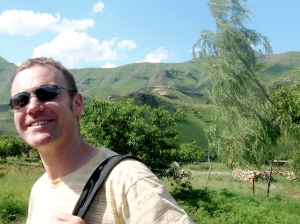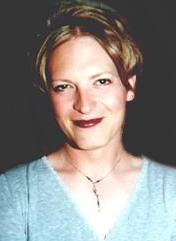Since finally coming out gay in my early 30’s (after 17 years of self-imposed therapies to de-gay myself) I was never that keen on finding a partner. Sure I dated, and I met some great guys, but first off I knew I had a ton of gunk to work through. One cannot go to war against one’s sexuality and personality the way I did without needing serious recovery. The Ex-Gay Movement with all the faulty oppressive teaching “ministers” and “therapists” served up with a warm loving touch did a number on me. Honestly I never thought I could ever be partner material.
Although “change” was not possible (as the ex-gays vaguely promised) recovery has been. Not that I have everything sorted out. Sadly I believe I will live with some of the negative effects of ex-gay treatment for the rest of my life. But not only does life go on for me, I have been able to reclaim much of my life, my art, my hope, and my sanity. With a handful of thoughtful, faithful, loving friends, I was prepared and content to live single the rest of my life.
In regards to romance and partnership, I hate it when people say things like, “Once you stop looking, that’s when you will find love.” Perhaps anecdotal evidence supports this claim, and unfortunately my own romantic situation plops me into the data pool of those who found love when not looking. Surely most people who find a partner have been looking for said partner. These folks don’t just drop out of the sky.

Glen Retief in Lesotho
Still, my partner did, in a matter of speaking, dropped from the sky. In 2008 I attended the Friends General Conference, an annual gathering of North American Quakers. We met that year on a college campus in Johnston, PA, and I roomed with my conference buddy, Dennis, a 65 year old+ scientist and dancer from Denver. We roomed in a wing of the dorm where many of the LGBTQ folks clustered (you get to request what cluster you prefer when you register.) The dorm rooms were such that two rooms shared a bathroom. When I heard someone on the other side of the two bathroom walls, I thought that we should meet and devise a protocol so that we do not inadvertently barge in on each other.
Just as I cracked open my bathroom door, the stranger in the next room burst in. Tall, gorgeous, and wearing only his underwear, he practically ran into me. I quickly explained, “Um, yeah, so, like, I guess we share a bathroom, so maybe we need to knock or do something before we enter.” Although he was the near naked one, he did not seem flustered one bit. “Yes, I did not realize.” he said with a lilting foreign-accent that sounded a mash-up of British and German. “My name is Glen.”
And that dear friends, is how I met my partner–in the bathroom at a religious conference. Glen, Dennis, and I spent much of the week together going to meals, talks, and Quaker worship. I was a bit harried as I co-led a daily workshop for teens and was scheduled to offer a plenary address to the 1000+ Quakers at the end of the weekend. Glen told me months later that at the time he did not know if Dennis and I were just friends or something more, and he hoped I was available.
I struggled with a sore throat the whole week. I obsessed so much that I would not be able to speak by the time I did my presentation, The Re-Education of George W. Bush, that I paid little attention to Glen. He did catch my attention after one of the plenary addresses when he expressed his strong, thoughtful opinion contrary to my own about something the speaker said. I found this to be extremely alluring. At one point he told me that he was a writer, and inwardly I remarked, “Yeah, right, everyone is a writer these days.”
 He saw my play and although he did not say so at the time, he was struck by my ability as an artist–not just another pretty face 😛 He then emailed me a chapter of a book he had begun, something about growing up in South Africa which I promised to read when I had some quiet time away from all the wild Quakers with all their many activities. Then we abruptly parted ways. He left a little early because he was concerned for the welfare of his cats, and I hurried back to Hartford to catch a plane to London to speak at the Lambeth Conference.
He saw my play and although he did not say so at the time, he was struck by my ability as an artist–not just another pretty face 😛 He then emailed me a chapter of a book he had begun, something about growing up in South Africa which I promised to read when I had some quiet time away from all the wild Quakers with all their many activities. Then we abruptly parted ways. He left a little early because he was concerned for the welfare of his cats, and I hurried back to Hartford to catch a plane to London to speak at the Lambeth Conference.
I meet so many people. I like many of them and stay in touch, but I felt something different about Glen, and found myself thinking of him and speaking about him to friends in the UK. “I met this really nice guy…but I’m sure it is nothing.” Then on a train going up North to visit friends in Wakefield I cracked open the email that held the attachment of Glen’s memoir excerpt. The prose was gorgeous. The story deeply moving. I concluded, “He really is a writer–not just another pretty face.”
And as they say, the rest is history. Of course we took other steps to get to know each other before we literally fell in love while hiking in the Pennsylvania Grand Canyon. We also each found the other to be freakishly compatible. We are both odd ducks in our own ways, and to find another that fits so well, is well, nothing short of miraculous–a statistical improbability. We compliment each other in multiple ways. We enjoy ourselves together immensely and we help each other to become better artists and better people. We intellectually spar, we comfort each other, we cook for each other, look out for each other, we partner in every aspect of our lives–personally, professionally, spiritually, domestically.

Glen Retief and Peterson Toscano
Next month in Washington, DC we will appeared together to present our work. Glen will read from his memoir, The Jack Bank, and I will perform scenes from my plays, I Can See Sarah Palin from my Window and Transfigurations (a play about transgender Bible characters.”
Glen and I often quote a favorite passage from the book of Ecclesiastes, a text used in many wedding ceremonies. It can easily apply to all sorts of couples, but the text appears to be speaking directly about two males (at least in the English translations I have read. I will have to check in on the Hebrew one of these days.)
Two are better than one, because they have a good reward for their toil. For if they fall, one will lift up his fellow. But woe to him who is alone when he falls and has not another to lift him up! Again, if two lie together, they keep warm, but how can one keep warm alone? And though a man might prevail against one who is alone, two will withstand him—a threefold cord is not quickly broken.
Ecclesiastes 4:9-12
—————————————————————–
Wanna check us out?
Tuesday, April 26, 11:00 AM Radio Interview with Glen about his book. WVIA’s ArtScene with Erica Funke
Wednesday, April 27, 7:30 PM Reading and book signing, The Jack Bank, at Susquehanna University
Saturday, April 30, 7:00 PM Reading and book signing, The Jack Bank, at Midtown Scholar, Harrisburg, PA
Friday, Saturday May 7 and 8 Peterson will perform I Can See Sarah Palin from my Window and Transfigurations in Oslo, Norway.
Wednesday, May 25, 7:00 PM Quaker and Public Witness, a joint presentation by Peterson Toscano & Glen Retief, at the William Penn House, Washington, DC
Thursday, May 26, 700 PM An evening with Glen Retief and Susi Wyss, Atomic Books, Baltimore, MD
Friday, Saturday June 24, 25 Reading by Glen Retief, performance by Peterson Toscano at Wild Goose Festival, Shakori Hills NC
Glen will also read at the Friends General Conference and Philadelphia Yearly Meeting (details to be announced)
Read Full Post »











 many many years ago. We also visited some of the towns people and even enjoyed some home brew.
many many years ago. We also visited some of the towns people and even enjoyed some home brew. round houses and gorgeous beaches with warm water from the Indian Ocean. I enjoyed getting tossed around by the strong waves as I watched the surfers. We swam a lot and on New Years Eve, as we watched the moon reflected on the water, we witnessed dolphins leaping around the wild waves. I took this as a good omen for the new year.
round houses and gorgeous beaches with warm water from the Indian Ocean. I enjoyed getting tossed around by the strong waves as I watched the surfers. We swam a lot and on New Years Eve, as we watched the moon reflected on the water, we witnessed dolphins leaping around the wild waves. I took this as a good omen for the new year.




